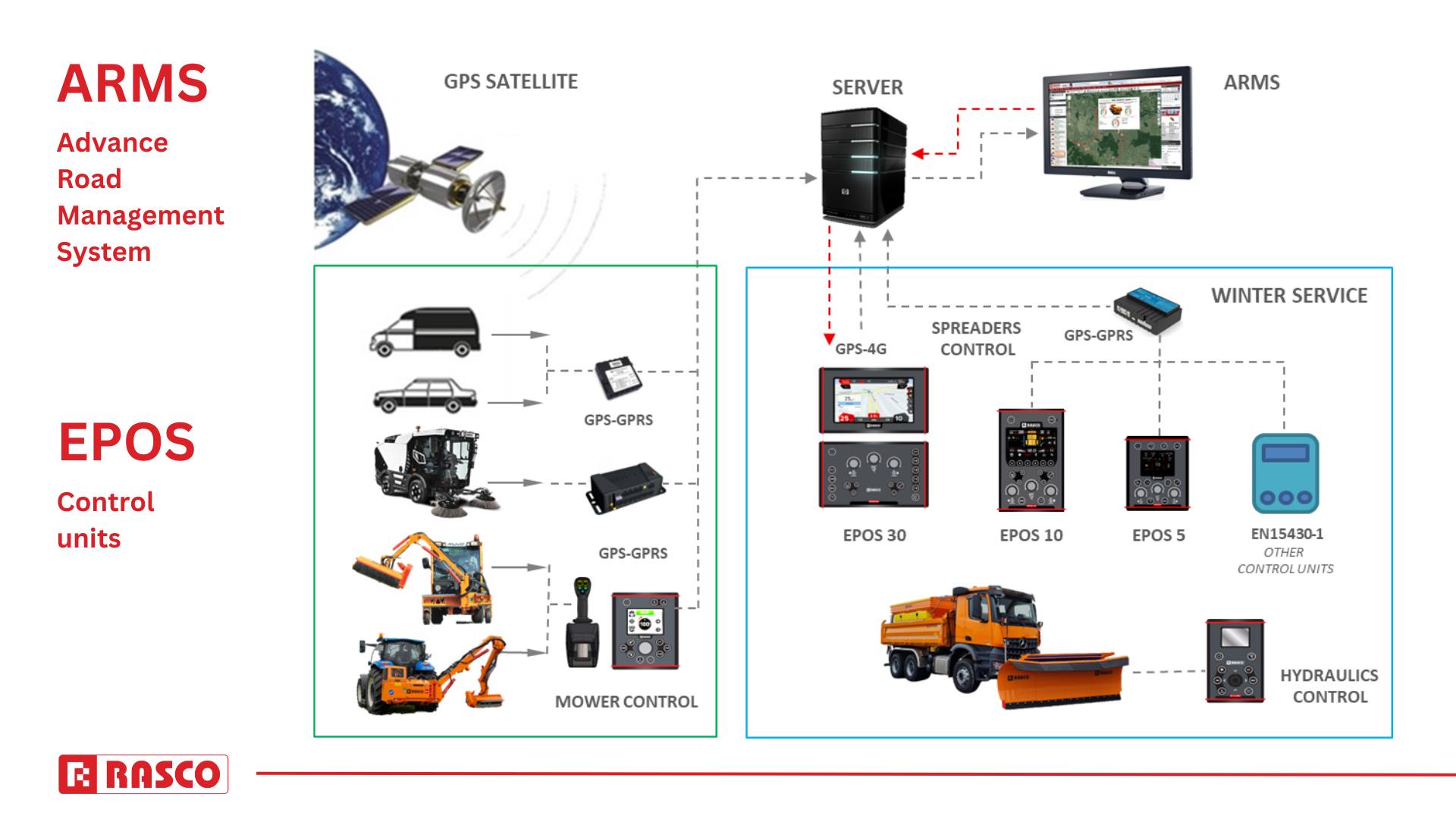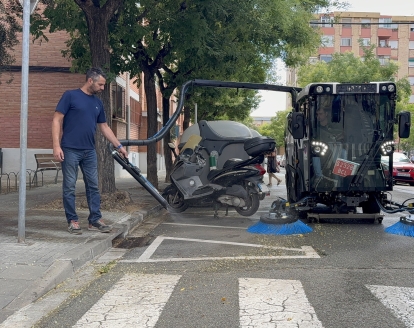Road Maintenance Fleet Management Systems by RASCO
Discover RASCO systems for efficient fleet management for vehicles used in road infrastructure maintenance: EPOS Control Units and the ARMS web application.
Road authorities face increasing operational and compliance demands in winter service and year-round road maintenance. Fleet management systems are essential for enhancing visibility, efficiency, and data-driven decision-making across road maintenance operations.
RASCO vehicles and equipment maintain roads all year round in over 40 countries on 5 continents. The company strives to exceed user expectations with its services and products. Continuous investment in product innovation, human resources, state-of-the-art machinery and technology form the basis for RASCO’s long-term success. RASCO’s products are designed for year-round maintenance of various road infrastructures. Advanced control systems and monitoring of equipment and vehicles are necessary to ensure proper operation. RASCO’s fleet management systems for road maintenance have been developed by RASCO experts in cooperation with users and are based on knowledge and experience gained in numerous markets.
ADVANCED FLEET MANAGEMENT SYSTEMS FOR ROAD MAINTENANCE
EPOS control units control the operation of all RASCO salt spreaders, making them one of the leading solutions for managing and controlling spreading activities. EPOS units ensure high precision in the execution of predefined spreading parameters and offer easy and safe operability. With these control units, RASCO salt spreaders operate according to the user’s requirements.
In addition to equipment management, monitoring and control of the equipment and vehicles equipped with control units is essential. For this purpose, RASCO offers ARMS — an information and communication system for management, centralisation of monitoring, reporting and optimisation of activities related to road infrastructure and fleet maintenance.
NEW GENERATION EPOS CONTROL UNITS
To meet the wishes and needs of users, RASCO has developed a new generation of EPOS control units that offer a wide range of benefits for users.
SIMPLE CONTROL OF THE SPREADER’S BASIC FUNCTIONS
For users who need simple control of the spreader’s basic functions, the basic control unit EPOS 5 is available. This unit precisely controls the functions of smaller and basic models of large spreaders. For precise and reliable road spreading, the EPOS 5 control unit uses rotation control sensors that provide feedback from all execution motors. The control system enables data collection and transmission for all spreader activities and facilitates control and reporting. The backlit LCD screen provides a clear display of information and alerts during operation.
ADVANCED CONTROL OF SPREADING
The most frequently chosen option for customers with large and combined spreaders is the technologically advanced control unit EPOS 10. It is characterised by its great functionality, versatility and ease of use. It can be used with all types of RASCO spreaders. Equipped with a colour screen, graphic and animated messages and functions for working with standard and special spreader configurations, it also has built-in Bluetooth, Wi-Fi modules and USB interfaces that allow the unit to be connected to mobile phones, computers and the Internet, as well as downloading data and software updates.
With the option of integrating sensors to measure the road temperature (thermal cameras), the EPOS 10 control unit offers four different operating modes based on the measured road temperatures, adjusting the spreading parameters without driver intervention. This option not only increases operator comfort, but also reduces the consumption of spreading material, which ultimately leads to cost savings, negative impact on the environment and preservation of road infrastructure.
CONTROL UNIT FOR THE MOST DEMANDING USERS
For the most demanding users who require advanced, automatic spread management functions, RASCO offers the EPOS 30 control unit. This advanced control unit enables the automatic spreading of roads based on the current location (GPS), previously recorded vehicle routes and predefined spreading parameters.
Based on the previously recorded spreading parameters, the control unit automatically adjusts the current spreading characteristics, such as width and asymmetry, to the GPS location. Furthermore, the spreading material quantity is increased at critical road locations (intersections, bridges, curves, inclines, etc.).
In addition to automatic spreading, EPOS 30 also offers road navigation along previously recorded spreading routes and navigation assistance if these deviate from the planned routes. Together, these features provide uncompromised operator comfort and ensure driving safety by reducing the need for driver intervention during spreading. In addition, material consumption, operating costs and environmental impact are reduced. Fuel consumption is also reduced, resulting in optimised performance overall.
OPTIMISING FLEET MANAGEMENT IS THE KEY TO REDUCING OPERATING COSTS
Key logistics costs for companies, including those involved in maintaining transport infrastructure, include fleet management, route planning, fuel consumption and other resource expenses. Managing and tracking these unpredictable costs is therefore essential. Key factors for successful logistics operations are planning efficient routes, regularly monitoring vehicles and tracking the consumption of relevant resources. By optimising routes and analysing machine, vehicle and operator performance, significant cost savings can be achieved.
Depending on the type of equipment and vehicles used and the type of maintenance required on the transport infrastructure, ARMS, a web application-based monitoring programme, is fully customised to the requirements and needs of the users. The system collects real-time data on the use of equipment and vehicles via mobile GSM data access, which is standard in almost all countries in the world. ARMS reports allow for quick and efficient monitoring of all tracked activities. The system is user-friendly and allows users to create report types, layouts and forms according to their needs.
NEW GENERATION OF THE WEB APPLICATION ARMS
During winter maintenance of transport infrastructures, it’s crucial to track the working hours of vehicles and equipment as well as the consumption of resources (such as spreading material or fuel) in real time. This information enables quick and easy decision-making regarding a possible reduction in fuel consumption by optimising operations, reducing material consumption and optimising driver working hours. The new ARMS interface enables the creation of automatic spreading reports via GPS -guided systems and the creation and updating of winter service routes via computer.
For summer maintenance of road infrastructure, such as mowing, users can track vehicle working hours and fuel consumption, as well as monitor the area worked per kilometre travelled to evaluate daily work performance.
The new ARMS interface facilitates the creation of user and service reports for the compact sweepers LYNX and LYNX Charge. Vehicle statistics, working hours of the vehicle, engine and cleaning, as well as the number of kilometres travelled while driving or cleaning can be tracked at LYNX. By connecting tracking devices to the vehicle’s on-board computer, reports can be generated on the consumption of all resources, including fuel, water and working fluids. The data collected via GSM technology is transmitted to the server, which generates the reports via the web application ARMS. For the electric sweeper LYNX Charge, important information about the battery status, such as charge level, voltage, charge status, temperature and service status, as well as possible operating errors can be monitored and reported.
USER-FRIENDLY APPLICATION
The data-capturing web application ARMS is hosted in the “cloud”. It is maintained by the experts, reducing operational costs and the need for system maintenance on the part of the users. Users can access the system from any computer, mobile phone or tablet through a simple web interface.
ILLUSTRATION OF RASCO’S FLEET MANAGEMENT SYSTEMS FOR ROAD MAINTENANCE:

UNCOMPROMISING CUSTOMER SUPPORT FOR ROAD MAINTENANCE OPERATIONS
One of the key benefits for RASCO users is the supply of a complete road maintenance solution from a single manufacturer. From equipping various vehicles with upgrades for road infrastructure maintenance to control and monitoring systems and after-sales support — all from a single source.
All RASCO control units, electronics and software solutions are developed in-house. This provides a significant advantage to users by enabling a quick after-sales support response or the development of new features based on individual requirements.
In addition, all existing ARMS web application software solutions are managed, developed and maintained by RASCO experts. All reports, displays and tools can be quickly upgraded with new features according to user requirements, providing fast and efficient responsiveness. By upgrading control units and monitoring systems for equipment and vehicles, RASCO continuously exceeds customer expectations.




